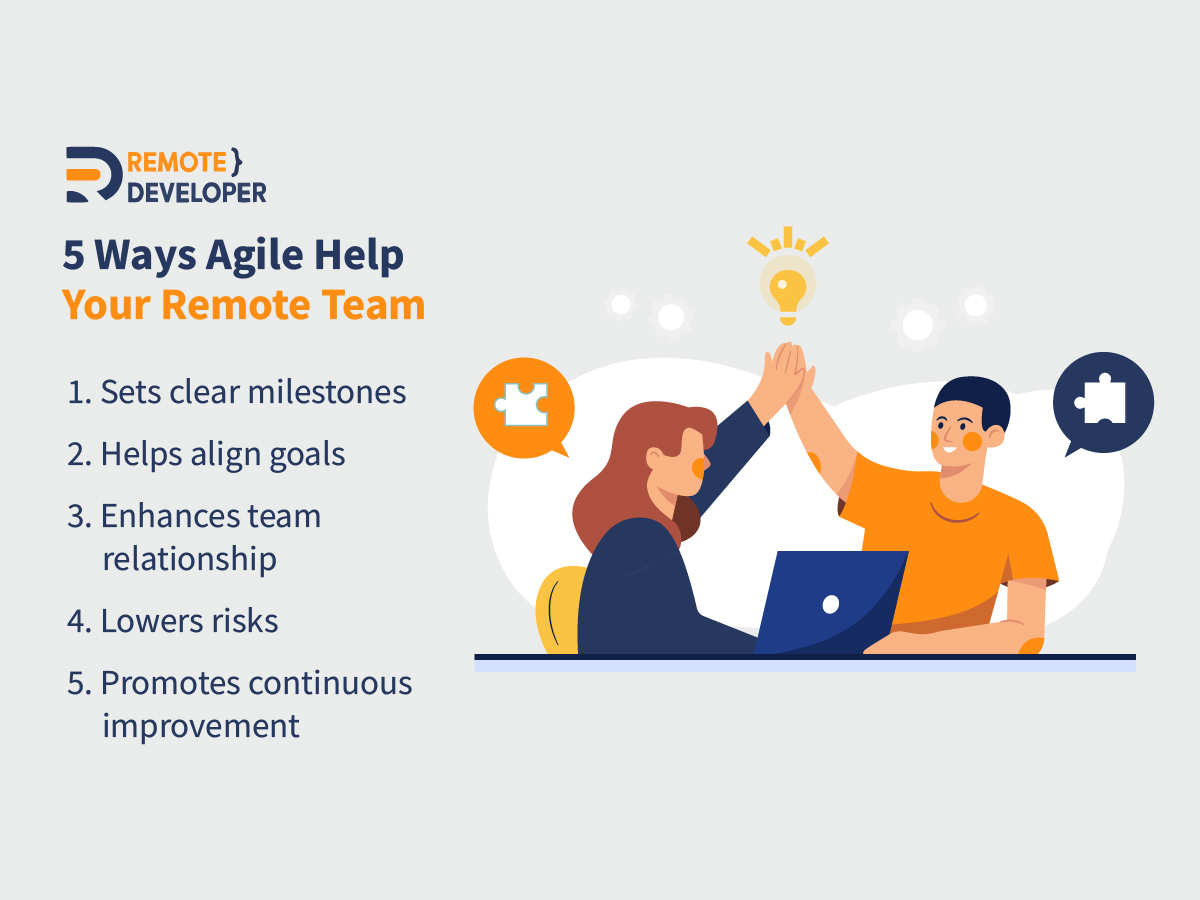In 2020, many IT companies shifted from office work to remote work as the COVID-19 virus spread. This sudden shift of work setup has raised concerns among software developers and engineers, especially those within a company who are not prepared to make agile work in a remote setting.
Agile methodology was designed to be used by development teams in an office setting. But did you know that remote teams and companies have also used Agile for years? Many organizations have experimented with Agile Developments’ capabilities even before the coronavirus outbreak.
For numerous IT outsourcing and third-party providers, Remote Agile teams have provided tons of benefits, including better work-life balance, excellent employee retention, higher productivity, and more. Implementing agile in remote teams provides benefits and helps solve challenges and make the team thrive.
It helped the remote development team be self-organizing, flexible, and quickly adapt to changes. It gave them more leeway for collaboration and feedback. This article will cover the basics of agile development and how it can make your remote team more successful.
What is Agile Methodology?
Agile methodology is a software development process based on iterative and incremental development. It is a relatively new approach to software development, which was developed in the early 2000s. This software development technique emphasizes customer collaboration, working software over comprehensive documentation, and responding to change.
Many organizations have adopted the Agile methodology because it helps them improve their business processes, products, and services. It also helps them to develop and release new products quickly. It allows the company to stay ahead of its competitors in the market.
The Agile Development process consists of the following:
- Iterative and incremental development
- Working in short cycles called “sprints.”
- Focus on delivering working software at the end of each cycle
- Promotes individuals and interactions over processes and tools
5 Ways Agile Helps Your Remote Team
As a team leader or manager, you want to ensure that your remote team is efficient. You try to create a remote work environment that promotes collaboration and empowers team members to do their work.
And while there are tons of other methods to make this work, Agile Framework can help your remote team deliver a high-quality product. You can create the perfect software in small increments while valuing adaptability, flexibility, and changes.
Likewise, here are ways how agile works with remote teams:

1. Sets clear milestones
Having clear milestones and objectives is essential for software development projects. It helps the team have a clear path, reach deadlines, and know that they are on track to their goals and progress.
However, most managers, especially those who use the waterfall method, don’t set clear milestones. They often assign tasks to their remote team members without setting a deadline and expecting them to finish them on time.
Remote agile development empowers team members to communicate and collaborate openly and together. Agile development includes planning and setting clear goals in every sprint. As such, the team leads set milestones to measure each developer’s performance and track the development of each part of the product.
Managers can easily ensure that developers finish the product or project on time. Even when team members live in different parts of the world, they know their goals, expectations, tasks, and timeline.
2. Helps align goals
The first and foremost issue among the remote team is aligned with the project and company goals. Keeping groups aligned with the organization in a face-to-face setting might be easy. However, aligning to one plan can be challenging in remote teams with limited interaction.
But with Remote agile development, team members are more likely to be aligned with work and achieve their goals. Since teams are conducting daily stand-ups or weekly meetings, it is easy for project leaders to remind developers about the project’s primary goal. They can reiterate the product owner’s requirements on each stand-up, ensuring that developers are aligned with each other.
In addition, adopting agile in a remote team can also help them refine any backlogs, see what needs to be worked on, and fix any that arise.
3. Enhances team relationships
In a remote setting, employees quickly feel lonely and alienated by the team. It can lower their morale, resulting in disengagement and sometimes resignation. But with regular check-ins in remote agile development, team members can build solid rapport and relationships across the team.
Moreover, agile focuses on collaboration and feedback. It improves team collaboration by increasing the frequency of input and reducing the need for face-to-face interactions. Increasing team collaboration leads to less confusion, team synchrony, and morale.
4. Lowers risks
In a remote setup, risks are inevitable. Companies try to avoid hiring remote workers due to its increasing legal, liability, and security risks. In fact, according to Owl Labs, in 2020, 40% of companies in the world do not allow remote work despite the COVID-19 pandemic. This is undeniable because of the risks remote work comes with.
But with remote agile development, companies can reduce these risks. Agile software development methodology promotes rapid and flexibility to change. They do tasks or parts of a product incrementally with every sprint.
And in each sprint, the development team and manager often mitigate risks to avoid the current or upcoming issue. They try to minimize errors in every product they develop. In fact, Agile has been proven to be more secure than other models because it allows for continuous testing and refinement of the product.
5. Promotes continuous improvement
Each sprint in agile comes with a retrospective. It is a meeting between the agile team at the end of a sprint that helps team members reflect on the past sprint and identify issues and solutions moving forward.
As such, retrospectives can be a great way to refine and improve the remote team’s process to make it more efficient and effective for the overall employee and team.
Conclusion
When your team works remotely, you probably want to implement a remarkable structure that allows collaborative work and productivity. And Agile can be your way to a successful remote team. It can help them be productive and cooperative and create a great work environment for your remote members.
If you are looking to hire remote developers well-versed in Agile Development, hire them from Remote Developer. Our developers are experts with Agile Framework, particularly Kaban and Scrum. Contact us now!

